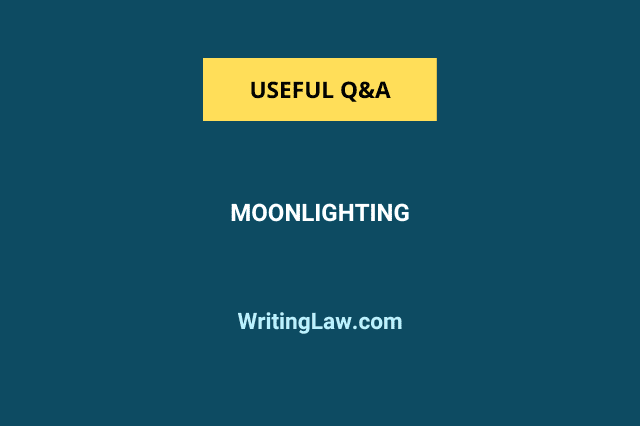
In this article, you will read about moonlighting, which emerged during the COVID-19 lockdown. You will also read how it is beneficial for some and harmful for others.
What Is Moonlighting?
Moonlighting is opting for a side job while already working full-time as an employee. Workers take up such jobs in secret without informing their primary employer. Such side jobs pose a threat to the confidentiality of an agreement of the primary job.
Moonlighting is basically doing two jobs simultaneously and hence, is also known as a dual employment scenario.
People opt for moonlighting to earn extra money to meet their expenses and also gain extra work experience.
Types of Moonlighting
There are different types of moonlighting, such as blue-moonlighting, quarter-moonlighting, half-moonlighting, and full-moonlighting:
- Blue-moonlighting: It refers to a situation where it gets difficult for the employee to manage multiple jobs.
- Quarter-moonlighting: Doing a part-time job along with the primary one.
- Half-moonlighting: Working more hours than usual part-time. Half-moonlighting is devoting 50% of their time to part-time work.
- Full-moonlighting: Doing two full-time professional jobs.
Background of Moonlighting
The practice of moonlighting came into the limelight during the pandemic when jobs were being done remotely (Work From Home), and employees were getting enough time saved from commutation. Moreover, due to the nationwide lockdown, many small projects were available which did not require full-time engagement and were potential enough to enrich someone’s income.
Legality and Ethicality of Moonlighting
Contradicting opinions have emerged regarding the ethicality of moonlighting. While some say it is ethical, others say it is unethical.
Moonlighting is ethical if the employee wants to gain extra work experience and can balance both works with full dedication. But it can be unethical since one employee is doing two jobs, out of which one could have been done by another employee. Moreover, if the employee neglects one job to complete the other, it becomes unethical on the part of the employee.
Talking about the legality of moonlighting, there’s no such law that completely bans the practice of moonlighting. Legality and illegality of the same depend on multiple factors such as rules and regulations of the companies, clauses of the contract of employment, prevailing laws in the country, etc.
However, if it has to be taken into consideration, moonlighting would be seen as cheating, where the employee has contracted to one company as a full-time employee and starts a new job somewhere else as well.
Consequences of Moonlighting
Information Technology (IT) companies are mostly against it, as such companies are data-driven, and the chances of disclosing confidential data by the employee to the competing firm are high. As a result of which, many companies have laid off their employees.
- Wipro laid off its 300 employees who were competing with its rival company.
- Infosys warned its employees that their indulgence in such practice would lead to termination of their service.
- Other companies like TCS and HCL have also abhorred (hated) the moonlighting practice.
Company That Has Allowed Moonlighting
Conversely, Swiggy (a food delivery company) has allowed moonlighting for their delivery personnel. Swiggy has allowed its staff to take up small gigs or projects during their off-working hours and has emerged with a policy as well. Such work will only be allowed if Swiggy approves it.
Swiggy has categorized the projects into two lists: A and B. List A projects are professional work, whereas list B is more non-professional and interests and hobbies inclined.
Advantages of Moonlighting for an Employee
- Monetary benefit.
- Work experience.
- Addition in skill.
- Exposure to a new working environment.
Disadvantages of Moonlighting for an Employee
- Difficulty in balancing work.
- Difficulty in balancing personal and professional life.
- Mental exhaustion.
Read Next:
1. What Are the Rights of Private Sector Employees in India?
2. When and Why Is a Legal Notice Mandatory?
3. What Are the Legal Consequences of Sexual Harassment in the Workplace?
- What Does “Justice Delayed Is Justice Denied” Mean? - 28th April 2023
- What Is Volenti Non-Fit Injuria Under the Law of Torts? - 25th April 2023
- What Are the Differences Between Possession and Custody? - 24th April 2023







